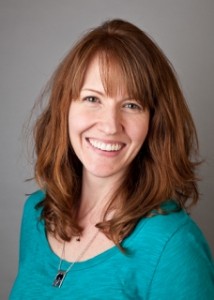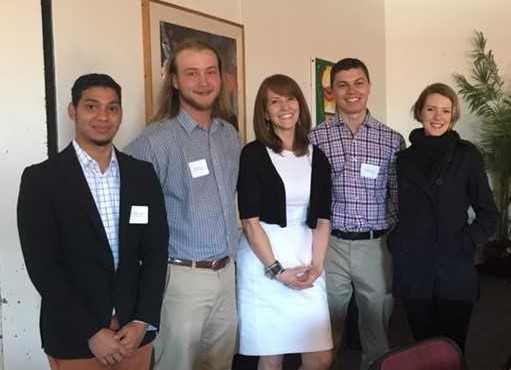Teacher of the Year Encourages Experimentation in Senior Seminar
In her first experience teaching history’s senior seminar, Meg Devlin O’Sullivan upheld department tradition by assigning a 25-30 page seminar paper in her course “Alcohol and Alcoholism in the United States: Drinking Cultures, Reforms, and Recoveries.”

Three weeks into the seminar, she tried an experiment that yielded surprising results. When presented an alternative to the long research paper, students took greater ownership of their writing, built community and acquired valuable life and professional skills.
In a lecture hosted by the Faculty Development Center, the College of Liberal Arts & Sciences’ Teacher of the Year gave an impassioned argument for embracing pedagogical change, which she’s detailed in a forthcoming article in Teaching History.
O’Sullivan, an assistant professor, holds a joint appointment in the departments of History and Women’s, Gender, and Sexuality Studies (WGSS). Though she teaches the WGSS senior seminar in alternate years, history’s senior seminar is not part of her regular teaching rotation.
O’Sullivan filled in for colleagues on leave last spring, putting her in the unique position of teaching two senior seminars simultaneously. Both seminars offered students a capstone experience, which challenged them to demonstrate all the knowledge and skills they’d acquired in their undergraduate majors, but the final projects took different forms.
Seeking an Alternative
When O’Sullivan’s history students learned that their WGSS counterparts were tasked with designing a course syllabus rather than writing a long research paper, they questioned the difference in assignments.
O’Sullivan attempted to get to the heart of their questioning. Did they think a syllabus project was easier, or was something else at work?
“What came out of our conversations is that they had really legitimate reasons to back up their feeling that a 30 page research paper did not serve them,” O’Sullivan recalled.
Some students argued that writing a lengthy research paper would not be a skill they’d be asked to demonstrate in their future careers, while others talked about wanting to hone other skills they felt were not adequately developed in their major courses, such as public speaking.
As it happened, the Phi Alpha Theta National History Honor Society was holding a regional undergraduate conference in Plattsburg at the end of April, and O’Sullivan wondered if a conference presentation might fulfill the seminar’s learning objectives while also honoring her students’ “hunger for other research paths.”
O’Sullivan broached the subject of alternative assignments with then-department chair Andy Evans, who gave the experiment his blessing. Students were given the academic equivalent of a choose-your-own adventure story. They could design a course syllabus like their WGSS peers, write a traditional seminar paper, or submit and present a research paper at the Phi Alpha Theta Conference.
Each of the alternatives required students to immerse themselves in secondary research, locate primary sources, craft an argument and develop a bibliography.
O’Sullivan’s former seminar student James Carroll ’16 (History) opted for the conference paper, a decision he felt best fit his career choice. He’s currently pursuing a master’s degree in adolescent education with a concentration in social studies at New Paltz.
“I enjoyed being a history major and knew it would apply to whatever I did after college, but I had no plans of being a professional historian so the traditional paper seemed like a chore,” he said. “The option I chose put me out of my comfort zone with the public speaking component, but it was something that I wanted to challenge myself with and seemed most applicable to my life after college.”
The Conference Experience
Four students presented at the conference, two chose the traditional paper and three wrote syllabi. A final student, whose paper was not accepted at the conference, presented his work to his seminar peers.
Though all seminar students seemingly worked hard, O’Sullivan perceived her conference students as demonstrating the greatest buy-in, pride, and effort. She believes the public component of the students’ work served as a powerful motivator. The students, she said, came to see her as a collaborator, while they most valued the opinions of the conference attendees and the panel commentator, who synthesized the panelists’ papers and offered criticism and feedback.
“They were really invested in ‘This needs to be right,’ because the universe now is this conference. They had a sense of ownership over their own material that I didn’t see present in my other students,” O’Sullivan said.
In preparation for the conference, O’Sullivan led the students through multiple rounds of edits. The students spent countless hours working on drafts and peer-reviewing each other’s work. In one instance, a student shared with a classmate a primary source document she believed would enhance his paper.
The students also gained professional experience in navigating the logistics involved in traveling for a professional engagement. They booked hotels, secured travel funding and corresponded with conference organizers.
Through their collaborative efforts, the conference students developed a deep bond of community. They supported one another throughout the research and editing process, attended each other’s presentations and mouthed words of encouragement to nervous peers.

Though not the intended focus of her seminar, the sense of community that emerged was “worth replicating and creating wherever we can,” O’Sullivan said. In her research for the article, she found support for this idea from Education Studies research, which demonstrated that students learn differently when they are in community than when their work is self-directed.
Carroll said the experience of presenting his paper on the Women’s Christian Temperance Union and its efforts beyond abstinence and suffrage enhanced his skills in research, editing, working with peers and public speaking.
“We also had a lot of fun,” he added. “If you asked me if this would be something that I would enjoy doing, I would’ve never believed it, but in the end, I had a great time, met new people, and created and presented something that I was really proud of.”
Be Brave
For her forthcoming article, O’Sullivan sought feedback from all of her history colleagues in an attempt to answer two overarching questions: what they thought students should gain from the seminar, and if the long research paper suits students’ needs.
Though O’Sullivan’s colleagues all structured their seminar around the long research paper, not one argued that writing 25-30 pages was the course’s intended goal. “All coalesced around the idea that students should engage in their own research, have the experience of being self-directed in their work, and stretch themselves intellectually and otherwise,” said O’Sullivan.
Further, almost all of O’Sullivan’s history colleagues argued that the long research paper did not serve all majors equally. Though two argued that it was the most useful exercise for history majors to complete, others argued that only a relatively small percentage of students actualized the seminar’s goals.
History Professor Lee Bernstein’s comment that he wanted his seminar students “to transition from being consumers of history to producers of history” struck a chord.
“What I saw with the conference folks, more than with the other group, was that clear transition from consumer to producer,” said O’Sullivan. As she noted in her article, the alternate assignment gave the students a “sense of intellectual ownership, community, and accomplishment through their experiences of public speaking, professional participation, and engagement with a broader scholarly audience.”
O’Sullivan argued that while colleagues need not jettison the 25-30 page seminar paper, it should not be the singular model for the capstone course. Because historians are multi-faceted—they write books, design courses, teach classes, review the scholarship of others, give talks, engage in public history—students can engage in the work of historians by completing assignments other than the long paper.
“What I’m making an argument for in a general way is experimentation—to be brave and be willing to try something new in seminar,” she said.
